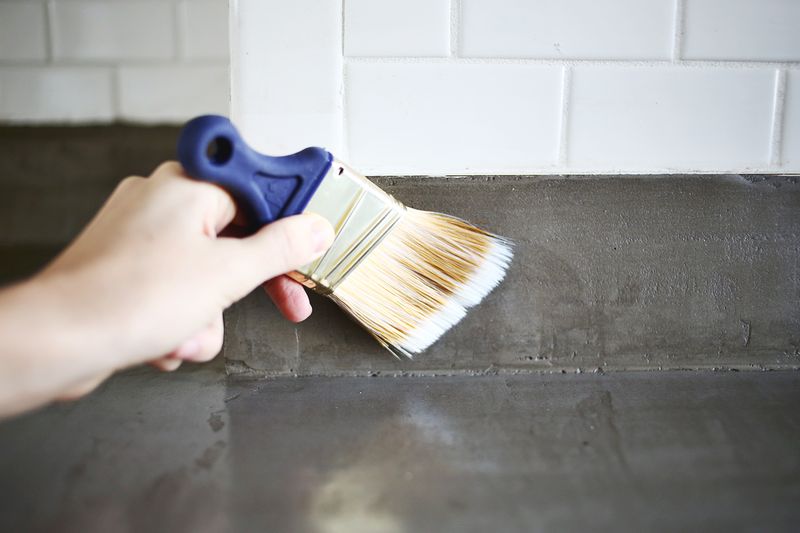Sealing concrete is essential to creating a durable and versatile product that will withstand years of use. Bare concrete is porous and vulnerable to staining and chemical attack, as liquids tend to soak into the surface and stain the concrete itself. Furthermore, acidic substances like vinegar and lemon juice will dissolve the cement paste, etching the surface. Sealing prevents etching and staining, and thereby turns concrete into a practical material for creating beautiful precast counters, furniture, and outdoor installations.
The ideal concrete sealer will have the following qualities:
- Won’t degrade the look or feel of the concrete slab
- Non-porous
- Resistant to stains from food, oil and other common household substances
- Resistant to any etching from acidic substances like lemon juice and vinegar
- Resistant to heat from pots and pans
- Resistant to UV degradation and yellowing from sunlight
- Scratch-proof
- Food safe/non-toxic
- Easily cleaned using common household cleaning products
- Won’t peel, flake, chip or bubble
We’ll explain a few sealing methods and materials to give you a better sense of your options for custom concrete products from Dogpaw. Concrete sealers can be categorized into two main types — penetrating sealers and topical sealers.
Penetrating Sealers
- Densifiers (also called hardeners) are water-based chemicals that react with the cement paste in the concrete, and work to harden the concrete surface and decrease its porosity.
- Repellants are mixed in with the concrete and work to changes the surface tension characteristics of the material so that liquids bead up easily (and therefore roll off or are easily wiped off). Repellants give concrete a very good resistance to abrasion, heat, and UV. Densifiers and repellants are often used together.
Penetrating sealers were developed to provide some protection to warehouse floors and to help keep architectural concrete clean from airborne dust and debris. They do not block contact with the concrete, but inhibit liquids from penetrating into the concrete, thereby making it easier to clean up spills.
Penetrating sealers don’t provide much if any protection against long-term exposure to aggressive staining agents (like wine, mustard and oil), nor will they provide much protection against acidic items. In fact, strong acid usually begins to etch the concrete almost immediately.
Penetrating sealers work best for concrete that gets infrequent or brief exposure to water, mild staining agents and non-acidic substances, and where cleanup is likely to happen quickly. Table tops (like end tables or coffee tables), fireplace mantles and hearths are good examples of where penetrating sealers work best. Because they become an integral part of the concrete, they cannot flake or peel off, and they usually don’t need to be reapplied at all, or for many years. Heat will not affect them, nor will exposure to sunlight.
Topical Sealers
- Wax is the most basic sealer used on concrete, and produces an attractive finish that brings out the best in the concrete’s color and visual texture. Wax will usually darken bare concrete. Wax unfortunately doesn’t provide the strongest seal over other types, and needs to be periodically reapplied in order to be effective.
- Acrylics are either solvent- or water-based, and are brushed, sprayed or rolled onto the concrete. Their best applications are on floors and driveways, and offer modest protection against stains.
- Epoxies are a two-component system of sealing. They give a hard and glossy finish, and are often tinted and used for sealing floors. Although tough and very stain-resistant, epoxies do not give good UV or heat resistance.
- Urethanes are a varied category of topical sealer, coming as one- or two-part mixes, as well as water- and solvent-based varieties. Urethanes tend to be very stain and heat resistant, provide UV resistance, and do not scratch easily. They typically give a very glossy finish. Matte versions also exist.
Topical sealers, also known as coatings, make up the bulk of the sealers on the market. There is a wide range of types with widely differing chemistries and varying degrees of appearance, performance and longevity.
Consult with Dogpaw on your desired precast application, and we’ll be happy to help you determine the best sealing option for your project and budget.

